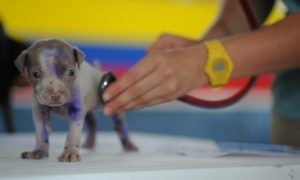Helping Fireworks Phobias

Dogs who react to fireworks can experience serious distress. They can exhibit behaviors as mild as panting, pacing and whining. Some dogs become upset enough to tremble, drool, bark, howl, or hide. Still others can become so terrified that they desperately attempt to escape from the house and will even urinate and defecate indoors from fear.
We don’t know why some dogs develop phobias to loud sounds such as fireworks. Some dogs seem to be more affected by the flashing lights, some to the sound, and some to the deeper vibrations.
If you are dealing with a dog with fireworks anxiety, it is important not to punish your dog for showing signs of anxiety. This will only make the problem worse. Medications can help but needs to be given in advance of the event for the best results. Once a dog is in full-blown panic mode it is too late.
The best time to begin helping a pet with fireworks anxiety is before the displays begin. When you know a fireworks display is scheduled, plan for your dog’s comfort.
Exercise your dog early in the day to burn off some energy, and then bring your dog inside well ahead of the event. Create a “safe room” for your dog. Close windows and curtains to help block the sound and light flashes. Leaving the lights on will also help with the flashes. Run a fan or air conditioner to drown out the sound or play soothing classical music. Provide a soft bed or small cozy crate.
Keep doors secure and windows latched. A panicked dog can break through a screen if it tries to run from the noise. Unfortunately, may dogs do escape from home around Independence Day. Make sure your dog is wearing a well-fitting collar with identification. Ensure that the contact information on tags is up-to-date and readable.
If you are attending any Fourth of July activities, leave your pet at home. Lots of people, warm weather and overstimulation combined with the stress of fireworks at night is a recipe for distress.
Not only dogs suffer from fireworks anxiety. Cats can be affected as well. Many of the “safe room” techniques are useful for keeping kitties calm during fireworks.
In the long-term, desensitization and behavior modification are best. Every dog is an individual, and not every technique for dealing with fireworks will work with every dog. Helping a dog through this type of phobia is labor intensive, but the results are worth it. Working with a trainer or behaviorist will make success more likely.
If you think your dog would benefit from behavior modification for fireworks phobia, contact us at 824-4108. Together we can evaluate your dog’s needs and determine if medication would be helpful.





